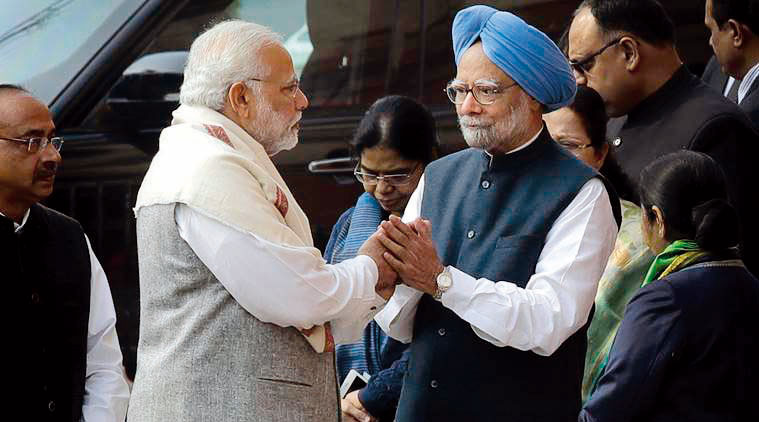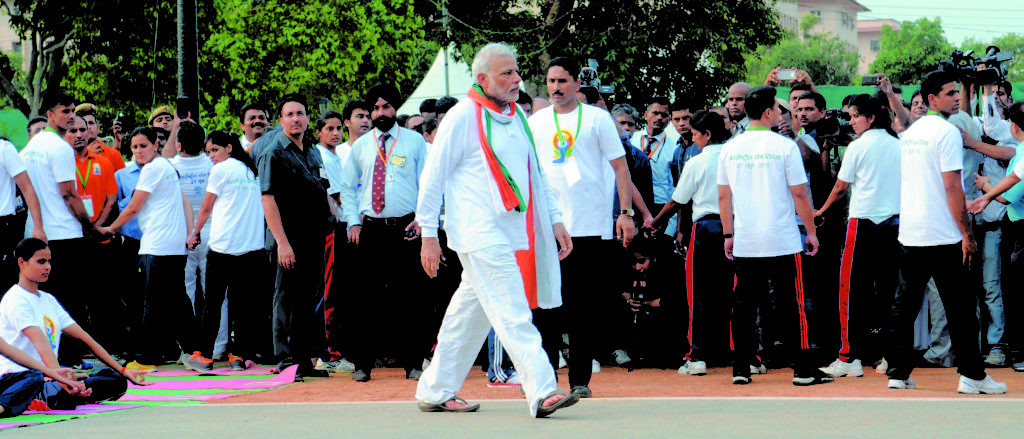Never engaged in debate, never answered questions, never made statements after his record foreign visits. He used Parliament to give longish speeches on formal occasions like the Reply to the Motion of Thanks to the Address of President to the Joint Session of Parliament
By Parsa Venkateshwar Rao Jr
2014 looks a long time ago. But on May 20, 2014, when he entered Parliament House, Narendra Modi made the dramatic gesture of genuflecting at the steps of the main entrance. In the Central Hall where the Bharatiya Janata Party (BJP) parliamentary party meeting, where he was formally elected the leader, he talked in an emotional manner about responding to the needs of the poor.
In his first speech in Lok Sabha, he declared that rivalries ended once the election results were announced and that members of the Lok Sabha from all parties need to work together for the country.
He also sounded a note of uncharacteristic humility when he said that he was a first-time member of the House and if he were to make any mistakes, he needs the indulgence of the more experienced members.
Curiously, he spoke in the two Houses of Parliament only on formal occasions. He spoke in the Motion of Thanks to the Address of the President to the Two Houses of Parliament, where he held forth in various degrees of persuasion and denunciation, especially as the five-year term rolled on, he was expansive in asserting the vision and achievements of his government and generally dismissive of the opposition.
He spoke on special occasions like the Constitution Day on November 26, 2016, the day the Constitution of India was adopted in 1949 and which also coincided with the year of Dr Bhim Rao Ambedkar’s 125th birth anniversary, at the midnight joint session of parliament on the on the occasion of the rolling out of the Goods and Services Tax (GST), a major tax reform, on the 75th anniversary of the Quit India Movement in August 9, 2017, reply to the no-confidence motion brought by Telugu Desam Party (TDP) on July 20, 2018.
The only time in five years that Modi had intervened pro-actively was on December 4, 2014, when he asked Rajya Sabha to accept the apology of first time Member of Parliament and Minister of State for Food Processing, Sadhvi Nikunj Jyoti, who referred to the Muslims in objectionable language.
There was an uproar in the House, and Modi interjected. He said, “unhone Kshama maangi aur mai maanta hoon ki Kshama maangne ke baad is sadan mein itne varisht log baithe hai, itne anubhavi log baithe hai ki Kshama ke prati unka bhaav kya rahtaa hai, ham us se bhali-bhaanti parichit hai…mein sadan se aagrah karoonga, prarthana karoonga ki jab mantriji ne Kshama maangi hai aur ham sab ke liye yeh ek Sandesh bhi hai, aage se ham bhi, sabhi log in saare Do’s and Don’t’s ke vishay mein koi maryaadaayein na tode aur mein sadan se aagrah karoonga ki ham desh hit mein apne kaarya ko aura age badhaaye.’
(She has sought forgiveness and I feel that after she has sought forgiveness in the House where the veterans are sitting, and so many experienced people are sitting that they know what is meant by the seeking of forgiveness, I would request and I would beseech that after the minister has sought forgiveness and it is a message for all of us, that even we, all of us that no one should break the Do’s and Don’t’s of conventions and I request the House that it should get back to the work of doing what is good for the country and take it forward.)
This intervention needed to be quoted because it is the only time he intervened in Parliament. It does not show his usual aggression. The prime minister sought to strike a calming note but he has done it in the most ambiguous way.
He emphasised the fact that she has sought forgiveness though Sadhvi Ninkuj Jyoti had merely said that if she had hurt any one’s sentiments, she regrets it. It was not an unqualified apology. That is why the opposition leaders said after the prime minister’s statement that the minister did not apologise.

The only time in five years that Modi had intervened pro-actively was when Sadhvi Niranjan Jyoti, who referred to the Muslims in objectionable language.
While speaking formally too, Prime Minister Modi could be seen breaking the bounds of parliamentary courtesy. In his reply to the Motion of Thanks to the President’s Address on February 8, 2017, he attacked former prime minister Manmohan Singh: “Doctor saab se bahut kuchh seekhne jaisa hai, itna saaraa hua aur un par ek daag nahi laga.
Bathroom mein rain-coat pehen kar nahaana, is kala ko toh doctor saab hi jaante hai aur doosra nahin jaanta hai.” (There is much to learn from the Doctor [Manmohan Singh], so much [scandals] has happened but he suffered no blemish.
Only the Doctor knows how to take a bath in a raincoat, no one else does.) The figure of speech was quite vulgar in parliamentary terms.

on May 20, 2014, when he entered Parliament House, Narendra Modi made the dramatic gesture of genuflecting at the steps of the main entrance.
It created another uproar in the Congress benches. Modi never conceded to the Congress demand that he should apologise for his ‘unparliamentary’ remark.
It was left to the Leader of the House Union Finance Minister Arun Jaitley to say that the government held Dr Singh in the high respect and that the former prime minister’s integrity was never in doubt.
It was again in August 2017 that Prime Minister Modi crossed the boundaries of decorum when he unsubtly hit out against the outgoing Vice President and Chairman of the Rajya Sabha Hamid Ansari, saying that Ansari can now feel free his views which were determined by Muslim-centric world-view because he had served mostly in Muslim countries.
It was a farewell speech and it was parliamentary practice to speak well of the person laying down the office. Modi could have said that he did not agree with Ansari’s views, but he respected him all the same. That was what one would have expected from the prime minister of the country.
But Modi proved time and again that he had no taste for niceties, and he would rather be blunt to the point of disrespecting a person. It would be unfair to see Modi’s negative remark about Ansari in isolation.
He also confessed that whenever he (Modi) met him (Ansari) after a foreign visit, his (Ansari’s observations) had taught him something valuable and useful about the world of diplomacy.
Most of his speeches in both Houses of Parliament were more like stump speeches, where he would denigrate the opposition and pat himself and his party on the back, enumerate the real and the not-so-real virtues and achievements of his government.
He did not understand that Parliament is a forum to explain the government’s policies and standpoint, and that it is not a place for declamation except for the odd occasion.
Most interesting is the fact that he did not make a single statement after his apparent record number of foreign visits where bilateral talks were held and agreements signed.
It was left to Minister for External Affairs Sushma Swaraj to read out the government’s formal statement in Parliament. Modi was holding the portfolios of Ministry of Personnel, Public Grievances and Pensions, Department of Atomic Energy and Department of Space.
It is indeed the tradition that the minister of state in the prime minister’s office responded to questions related to this ministry and to these departments, but the prime minister would occasionally respond to the questions himself.
But Modi did not ever do it, and he even gave the impression that he avoided it. It is true that the prime minister should speak on major issues of policy but involvement in parliamentary proceedings at others levels is also expected of him.
It is a fact that he covered all the bases on policy and initiatives in his formal reply to the Motion of Thanks to the President’s Address, but it deprived him of taking in the cut and thrust of parliamentary debate. It seemed that the prime minister did not relish the prospect of engaging with the leaders of opposition.

Modi attacked former prime minister Manmohan Singh: “Doctor saab se bahut kuchh seekhne jaisa hai, itna saaraa hua aur un par ek daag nahi laga. Bathroom mein rain-coat pehen kar nahaana, is kala ko toh doctor saab hi jaante hai aur doosra nahin jaanta hai.”
At the end of his first speech on June 11, 2014, which was his reply to the debate on the Motion of Thanks to the President’s Address, Modi said, “aaj naye sadan mein mujhe apni baat bataane ka avsar mila.
Aadaraneeya adhyaksha mahodaya ji, kayee koyee shabd idhar-udha ho gaya ho, agar mein niyamon ke bandhan se baahar chalaa gayaa hoon toh yah sadan mujhe zaroor Kshama karega.” (I had an opportunity to place my views before this new House.
Respected Madam Speaker, if somewhere I had slipped in my use of words, and went beyond the limitations of the rules, the House will surely forgive me.)

It is true that the prime minister should speak on major issues of policy but involvement in parliamentary proceedings at others levels is also expected of him.
In his last speech in Lok Sabha on February 13, 2019, Modi had displayed his characteristic satirical observances which showed a rare glimpse of humour and wit.
He said: “mein pehli baar yahaan aayaa thhaa, mujhe bahut see cheezein nayee jaan ne ko milee, jiska mujhe kuchh arth hee zindagi mein pataa naheen thhaa. Pehlee mujhe pataa chalaa ki galey milnaa aur galey padnaa mein kyaa antar hota hai. Yeh mujhe pehlee baar pataa chalaa hai. Mein pehlee baar dekh rahaa hoon ki sadan mein aankhon sey gustaakhiyaan hoti hai. Yeh aankhon ki gustaakhiyon wala khel bhi pehlee baar isee sadan mein dekhne ko mila aur desh ki media ney bhi uska bahut mazaa liya.”
(I have come here for the first time and I got to know many new things, things whose meaning I did not know in my life. For the first time, I came to know the difference between embracing and being a burden around one’s neck.
This I have learnt for the first time. I am seeing for the first time the games that can be played with eyes. This eye game I have seen for the first time in the House and the national media too saw it and enjoyed it.)
Modi spoke his long pieces in the two Houses without notes. He showed that he could speak at length extempore, though not with the same charm as did Atal Bihari Vajpayee. At the end of his first term as Member of Parliament, Modi has still to acquire the skills of a parliamentarian.
